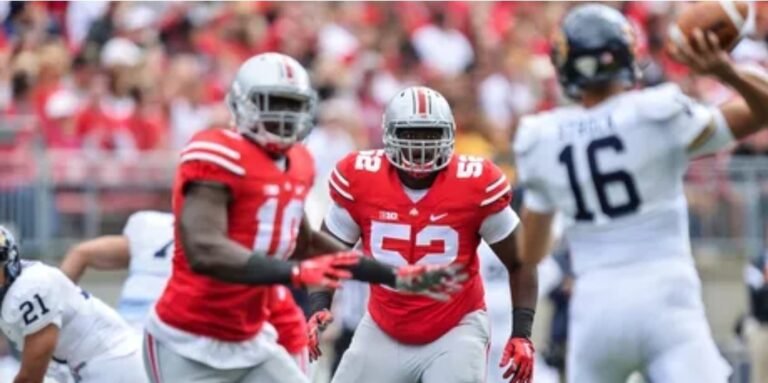Donovan Munger, a defensive lineman who helped the Ohio State Buckeyes secure their 2014 National Championship, has tragically passed away at the age of 30. His death, still shrouded in mystery, has left many wondering about the circumstances behind the loss of a young athlete whose promising career was overshadowed by adversity. Munger, who was known for his imposing presence on the field, was a key contributor to the Buckeyes’ defense during one of the most remarkable seasons in Ohio State history. However, his journey off the field tells a much more complicated and painful story.
Munger’s football career at Ohio State began with high expectations. He was a standout defensive lineman at Cleveland Heights High School, which led to him being highly recruited. His size, strength, and explosive athleticism made him a perfect fit for Urban Meyer’s defensive scheme, and his presence on the line helped anchor a defense that was instrumental in the Buckeyes’ undefeated 2014 season. That year, Ohio State overcame early-season struggles, injuries to key players like Braxton Miller, and a mid-season loss to Virginia Tech to ultimately win the inaugural College Football Playoff National Championship. Munger, a reserve player, played a supporting role but was still a crucial part of the team’s depth, helping the team manage the physical toll of a championship season.
Yet, Munger’s life beyond the field was not as smooth as his athletic career. The former defensive lineman faced numerous challenges, including injuries that kept him off the field more than he would have liked, and the inevitable clash between the life of a college athlete and the pressure to live up to high expectations. After his time at Ohio State, Munger struggled with what many consider the darkest side of college sports — the lingering effects of injury, the emotional toll of being part of a team and a system that often discards its players when they no longer contribute to the immediate goals of the program.
After leaving Ohio State, Munger’s life took a turn. In the years that followed, he faced legal and personal battles, including several incidents that cast a shadow over his life post-football. In the eyes of many, Munger was not the shining example of a championship athlete who went on to find success in life after football. He battled the same demons that so many former athletes face, struggling with identity after the spotlight faded, and with coping mechanisms that may have been less than healthy. His passing at 30 has sparked discussions about the well-being of athletes long after they leave the collegiate spotlight, questioning the system that often glorifies the athletes during their time at school but fails to support them once their playing days end.
While Munger’s family and those close to him have not fully disclosed the cause of his death, the tragic event highlights the broader issue of mental health, substance abuse, and the toll of physical injuries on athletes. Munger’s struggles, which many would have never known about due to his stoic public persona, serve as a stark reminder that the life of a collegiate athlete is often more complicated and fraught with peril than outsiders realize.
As his family and friends mourn the loss of a beloved figure, Munger’s death also opens a broader conversation on how the world of college sports continues to fail its athletes. In a system that profits off the labor of young men, yet often leaves them without proper care or guidance once they are no longer useful on the field, Munger’s story may very well be one of many. His life and death demand that we confront the real consequences of pushing young athletes to their limits without proper consideration for the mental, physical, and emotional toll that often lingers far beyond the final whistle.
The Ohio State community, fans, and former teammates of Munger are left grappling with the tragic loss of one of their own. While Munger’s story is, unfortunately, not unique, it serves as a poignant reminder of the importance of mental health and well-being in sports — and how, sometimes, the most promising careers can end before their time.
